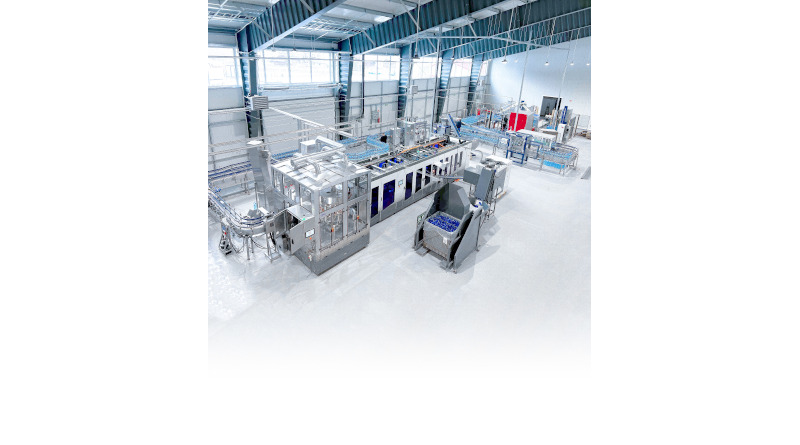Sustainable filling lines in Poland
Reaching new heights in water bottling
Polish producer of mineral water, Masspol is a supplier to one of the leading chain stores in the country. What allowed them to secure a long-term business partnership, was to expand their offering with a 5 l bottle. Answering the call for the upsizing trend, STM Group provided Masspol with a sustainable filling line, increasing the number of bottles on a pallet by 25%.
It’s been a while since the pandemic has eased its grip on people. Now that countries are faced with post-Covid inflation, shopping for bargains has never been so important. Since value for money is sought after, buying in bulk and in big packages became a common practice in many households. On top of that, the unwavering convenience of home delivery has further solidified the habit of purchasing in large size containers and multipacks.
As the era of social distancing came to an end, consumer focus shifted from safety and supply to green solutions. Sustainability has been the core influence in the packaging industry for some time now. Public awareness around the issue is reflected in the ever-changing retail landscape. According to West Rock – Pulse Packaging 2022 survey, we know how eco-friendly features impact consumer satisfaction. Notably, the packaging being right-sized is important for 63% of people; 62% pay attention to the fact that the product does not use excessive packaging; as much as 55% claim to look for packaging made from recycled materials; 54% are interested whether the manufacturing of the packaging produces fewer carbon emissions.
When it comes to the mineral water industry, there is yet another issue one must take into account. Mainly, the dilemma faced by consumers on where and how to obtain drinking water. With numerous options to filter tap water at home, combined with lobbying against bottled water manufacturers, appealing to consumers’ preferences and conscience becomes a challenge. With new laws and regulations by EU and local governments to reduce waste and emissions, improve recovery and recycling, manufacturers have to make careful investment decisions. STM’s recent project for Polish company Masspol is the answer to these modern-day market requirements.
Masspol’s mineral bottling plant (manufacturing and water intake) is located in the town of Zubrzyk in the Beskid Sadecki region of Poprad Landscape Park. The company has been producing mineral and spring water packed in 500, 700, 100, 1,500 ml PET bottles. Expanding their offering with 5,000 ml water bottles, the company chose STM Group to build a filling line (another project for this client). Having received a return on previous investments (two blow moulding machines), Masspol hoped to make another profitable development.
STM set itself the task of designing the whole production process in the most eco-friendly way. From PET bottle design to palletisation – every stage was conceived with sustainability in mind. Masspol needed energy-saving technology for the PET production to be eligible for EU funds from the Intelligent Development Programme. The project involved manufacturing a complete turnkey filling line for 5,000 ml PET bottles. To meet the expected capacity of 4,000 bph, STM suggested the STM Synchroblok Combifill 4/16/6 FlowMatic BIG. The machine features 4 cavity moulds, 16 filling nozzles and 6 capping heads.
The first eco-innovation involved reducing preform weight from the standard 68 g to 58 g. This way, STM was able to lower the energy consumption down to 13 W for blowing and filling one 5,000 ml bottle (without nitrogen dosing). Secondly, TES STM Group patented and implemented an original system for recovering compressed air from the blow moulding machine. STM was able to capture 40% of the air (up to 10.5 bar) and deliver it to all peripheral devices in both, STM line and an adjacent line for 1.5 l bottles at 18,000 bph. 120 Nm3 of compressed air every hour was saved. As a result, air compressors are in operation less frequently and the whole manufacturing plant is more energy efficient.
The palletising stage was also defined by demands for sustainability. Although it is still a common practice in the industry, glueing the bottles together was out of the question for the client. Yet, by far the biggest engineering feat was to increase the number of bottles on the pallet: from 108 to 135. It called for a unique bottle design – taller and slimmer than the classic model – for higher packing efficiency. Wrapping was adjusted accordingly. The dedicated palletising system combines two rotating plate pallet wrappers and the process occurs right at the stacking places – without any transfer. This solution allowed a capacity of 25 pallets/hour to be achieved.

